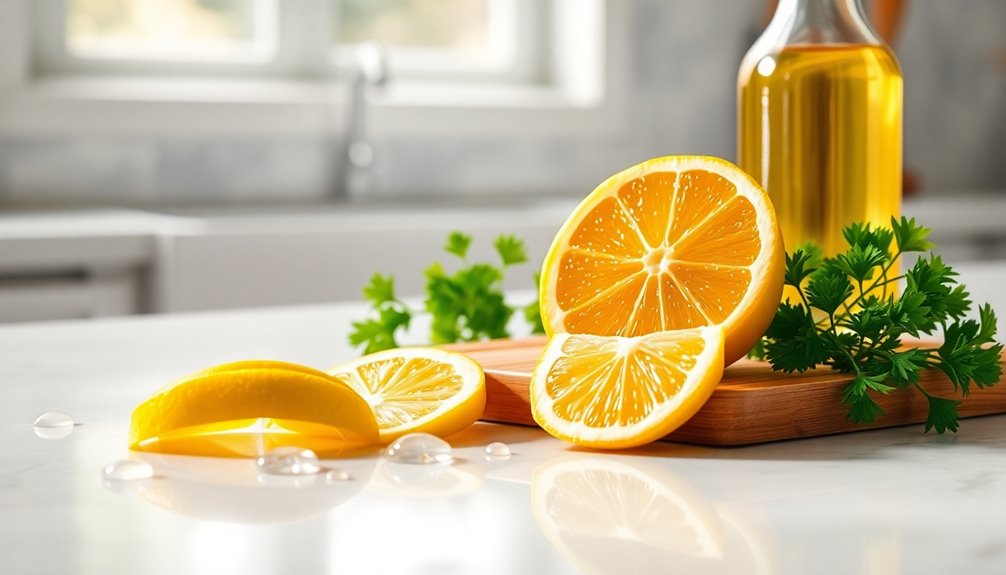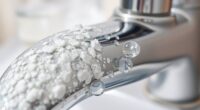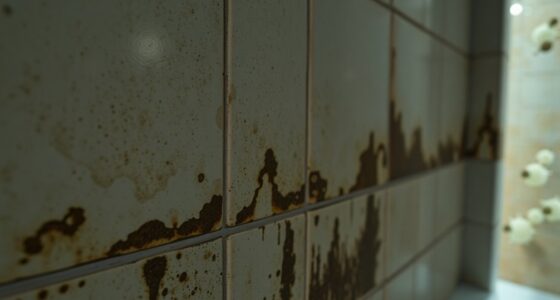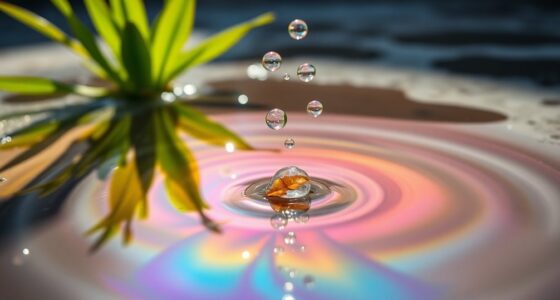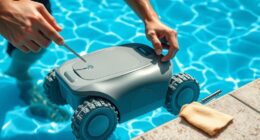Using lemon juice and vinegar for household cleaning is a fantastic choice. They're natural, non-toxic, and budget-friendly solutions that effectively tackle grease, stains, and odors without harsh chemicals. Lemon juice has antibacterial properties, while vinegar works as a powerful disinfectant. You can create your own cleaning solutions easily, making your home safer for kids and pets. Plus, these ingredients improve indoor air quality. Stick around to discover more ways to incorporate these natural cleaners into your routine!
Key Takeaways
- Lemon juice and vinegar are effective natural cleaners that tackle grease, stains, and bacteria without harmful chemicals.
- Their antibacterial properties help eliminate harmful germs like E. coli and salmonella, ensuring a safer home environment.
- These solutions are non-toxic and budget-friendly, making them ideal for households with children and pets.
- Homemade cleaners using lemon juice and vinegar can improve indoor air quality by reducing synthetic chemical exposure.
- Proper storage and usage of these solutions help maintain their efficacy and environmental benefits, minimizing waste and toxicity.
Understanding the Cleaning Properties of Lemon Juice and Vinegar

When you think about effective cleaning agents, lemon juice and vinegar should top your list. These natural cleaning solutions pack a powerful punch against grease and stains.
Lemon juice, with its low pH, cuts through tough grime while offering antibacterial properties. Vinegar, also acidic, works as a potent disinfectant that tackles bacteria and dissolves mineral deposits.
Together, lemon juice and vinegar create a dynamic duo for cleaning hard surfaces, kitchens, and bathrooms. They're non-toxic, budget-friendly, and safe for kids and pets, making them ideal for eco-conscious households. Additionally, using natural cleaning solutions can improve indoor air quality, providing a healthier environment for you and your family.
Plus, their combined aroma can help mask vinegar's strong smell, making your cleaning experience more pleasant. Embrace these effective cleaning agents for a fresher, cleaner home!
The Antibacterial Benefits of Lemon and Vinegar

Lemon juice and vinegar not only serve as effective cleaning agents but also boast impressive antibacterial benefits. Here are a few reasons to use them in your cleaning routine:
Lemon juice and vinegar are powerful, natural cleaning agents with impressive antibacterial properties.
- Citric Acid: Lemon juice contains citric acid, which kills harmful bacteria like E. coli and salmonella.
- Acetic Acid: Vinegar, particularly white vinegar, features acetic acid that combats various germs effectively.
- Natural Disinfectant: The combination of lemon and vinegar creates a powerful natural disinfectant, reducing bacteria in your home.
- Safer Alternative: Using these natural ingredients provides a safer alternative to chemical-laden cleaners harmful to health and the environment.
- Additionally, incorporating HEPA filters in your home can further enhance indoor air quality by reducing airborne pathogens.
How to Create Effective Cleaning Solutions With Lemon and Vinegar

Combining the antibacterial properties of lemon and vinegar with effective cleaning methods can elevate your home cleaning routine. Here's how to create potent cleaning solutions:
| Recipe | Ingredients | Storage Duration |
|---|---|---|
| All-Purpose Spray | 100 ml vinegar, 100 ml boiled water, 1 tsp lemon juice | Up to 7 days |
| Long-Lasting Cleaner | 250 ml vinegar, 250 ml boiled water, 15-20 drops lemon essential oil | 6-8 weeks |
| Lemon Peel Cleaner | Steep lemon peels in vinegar for 2 weeks | Powerful for tough grime |
| Basic Cleaning Solution | Mix lemon juice and vinegar with water | Effective against stains |
| Sensitive Surface Solution | Dilute with water for wood or stone cleaning | Protects surfaces |
Use these natural cleaners to effortlessly tackle dirt and odors throughout your home! Additionally, the use of sustainable practices in cleaning reflects a growing awareness of eco-friendly solutions in household maintenance.
Best Surfaces to Clean With Lemon Juice and Vinegar

When you're looking to clean your kitchen and bathroom surfaces, lemon juice and vinegar are your go-to solutions.
They tackle grease on countertops and leave your stainless steel appliances sparkling.
In the bathroom, they effectively remove limescale from taps and shower screens, making your space shine. Additionally, using these natural cleaners can improve indoor air quality, contributing to a healthier living environment.
Kitchen Surfaces and Appliances
Many kitchen surfaces and appliances can benefit from the cleaning power of lemon juice and vinegar.
This dynamic duo forms an effective all-purpose cleaner that tackles tough grime effortlessly.
Here are four great uses:
- Countertops – Use lemon juice and vinegar to eliminate stains, grease, and odors.
- Stainless Steel Appliances – Wipe away fingerprints and achieve a streak-free shine with this combo.
- Kettles and Coffee Makers – Descale these appliances easily with vinegar.
- Cutting Boards – Sanitize surfaces and neutralize odors using lemon juice.
Additionally, ensuring proper airflow around the unit can enhance the cleaning effectiveness of your homemade solutions.
Bathroom Fixtures and Tiles
Lemon juice and vinegar make a powerful team for cleaning bathroom fixtures and tiles, effectively tackling soap scum, hard water deposits, and mineral buildup. Their acidity dissolves grime, while also deodorizing surfaces for a fresh scent. You can safely use this dynamic duo on stainless steel fixtures, enhancing their shine without harsh cleaning products. Additionally, regular use of these natural cleaners can help prevent limescale buildup, ensuring your bathroom remains sparkling and hygienic.
Here's a quick guide to maximize your cleaning efforts:
| Surface Type | Cleaning Method |
|---|---|
| Faucets | Apply diluted lemon juice and vinegar, let sit, then scrub. |
| Showerheads | Spray mixture, wait a few minutes, and wipe clean. |
| Tiles | Use the same mixture, scrub lightly to remove stains. |
| Bathtubs | Soak tough spots with the solution for better results. |
| Mirrors | Wipe with a diluted mix for a streak-free shine. |
Regular use prevents limescale buildup, keeping your bathroom looking pristine!
Tips for Using Lemon and Vinegar Safely
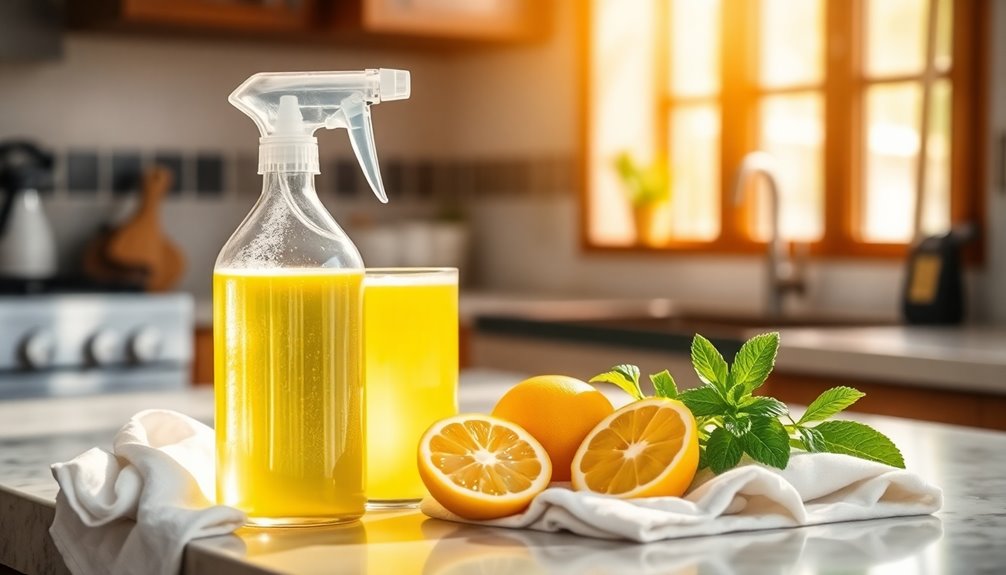
When using lemon juice and vinegar for cleaning, safety should be your top priority.
Always test your mixture on a small area first to prevent any unwanted damage, and never combine these ingredients with harmful chemicals like bleach.
To keep your homemade solutions effective, store them properly and use them within the recommended time. Additionally, consider incorporating sustainable farming practices into your cleaning routine by using eco-friendly ingredients.
Avoid Mixing Harmful Chemicals
Although using natural cleaners like lemon juice and vinegar can be effective, it's important to avoid mixing them with harmful chemicals. Here are some significant tips to keep in mind:
- Never mix vinegar with bleach – This creates toxic chloramine vapors that can harm your respiratory health.
- Don't combine vinegar or lemon juice with hydrogen peroxide – This forms peracetic acid, which irritates your eyes and skin.
- Check product labels – Verify that commercial cleaners are safe to mix with vinegar or lemon juice to avoid dangerous reactions.
- Store homemade solutions properly – Keep them in a cool, dark place and use them within the recommended time for maximum effectiveness.
- Consider the impact of cookies – Understanding how necessary cookies support secure and functional website operations can help you navigate online cleaning supply resources more effectively.
Test on Inconspicuous Areas
How can you guarantee that your cleaning efforts with lemon juice and vinegar are safe for your surfaces? Always test on inconspicuous areas first.
Apply a small amount of your lemon juice or vinegar solution to a hidden spot and let it sit for a few minutes. This simple step helps identify any adverse reaction or damage, especially on painted or delicate surfaces.
Remember, surfaces like granite and marble should be avoided, as using vinegar and lemon juice can etch and leave permanent marks. Additionally, regular maintenance of surfaces can help prolong their life and prevent damage.
After rinsing the test area, observe it for at least 24 hours to confirm no delayed reaction occurs. This precautionary measure makes your cleaning experience safer and more effective.
Store Properly for Longevity
Once you've confirmed that your cleaning solutions are safe for your surfaces, the next step is to store them properly for longevity. Here are some essential tips:
- Store lemon juice in a sealed container in the refrigerator to keep it fresh and extend its shelf life.
- Keep vinegar in a cool, dark place, away from direct sunlight, to maintain its effectiveness as a cleaning agent.
- Always use diluted solutions of vinegar and lemon cleaner to reduce acidity, preserving surfaces and enhancing longevity.
- Label your homemade cleaning solutions with the preparation date and aim to use them within 7 days for best results.
- Consider the importance of preserving surfaces when choosing your cleaning methods to avoid any potential damage over time.
Comparing Lemon Juice and Vinegar for Household Cleaning

When it comes to household cleaning, both lemon juice and vinegar offer powerful, natural solutions that can tackle a variety of tasks.
While both have similar pH levels, lemon juice shines at neutralizing odors and cutting through grease. On the other hand, vinegar excels in removing limescale and disinfecting surfaces.
Lemon juice effectively neutralizes odors and tackles grease, while vinegar is ideal for removing limescale and disinfecting surfaces.
You can even mix lemon juice with vinegar to enhance their cleaning power, as their acidity effectively tackles dirt and grime without harmful chemicals.
Both options are safe for use around children and pets, making them eco-friendly alternatives.
Just keep in mind that lemon juice has a pleasant scent that can mask vinegar's strong odor, which might deter some users despite its cleaning efficiency.
Creative Ways to Use Lemon and Vinegar in Your Cleaning Routine

Incorporating lemon juice and vinegar into your cleaning routine can transform your approach to tackling household tasks.
Here are some creative ways to use them:
- All-Purpose Cleaner: Mix equal parts lemon juice and vinegar in a spray bottle for a powerful cleaner that cuts through grease and odors.
- Microwave Deodorizer: Boil a cup of vinegar and lemon juice in the microwave to loosen food particles and eliminate smells.
- Infused Cleaner: Steep lemon peels in vinegar for two weeks, then dilute with water for a fresh-scented cleaner.
- Stain Remover: Combine baking soda and lemon juice into a paste for tough stains on kitchen surfaces.
With these methods, you'll enjoy a cleaner, fresher home using natural ingredients!
Environmental Benefits of Using Natural Cleaning Agents

Using natural cleaning agents like lemon juice and vinegar not only enhances your cleaning routine but also offers considerable environmental benefits.
By opting for these eco-friendly cleaning solutions, you reduce your reliance on synthetic chemicals, promoting a healthier indoor environment. Unlike commercial cleaning products that generate carbon emissions during production and transportation, homemade cleaners from lemon and vinegar minimize this impact.
Plus, you'll considerably decrease plastic waste since these natural ingredients can be stored in reusable containers rather than single-use plastic bottles.
With low environmental toxicity, lemon juice and vinegar are safer for aquatic ecosystems when disposed of, making your choice not just good for your home but also for the planet.
Embracing these natural options supports sustainable living.
Common Mistakes to Avoid When Cleaning With Lemon and Vinegar
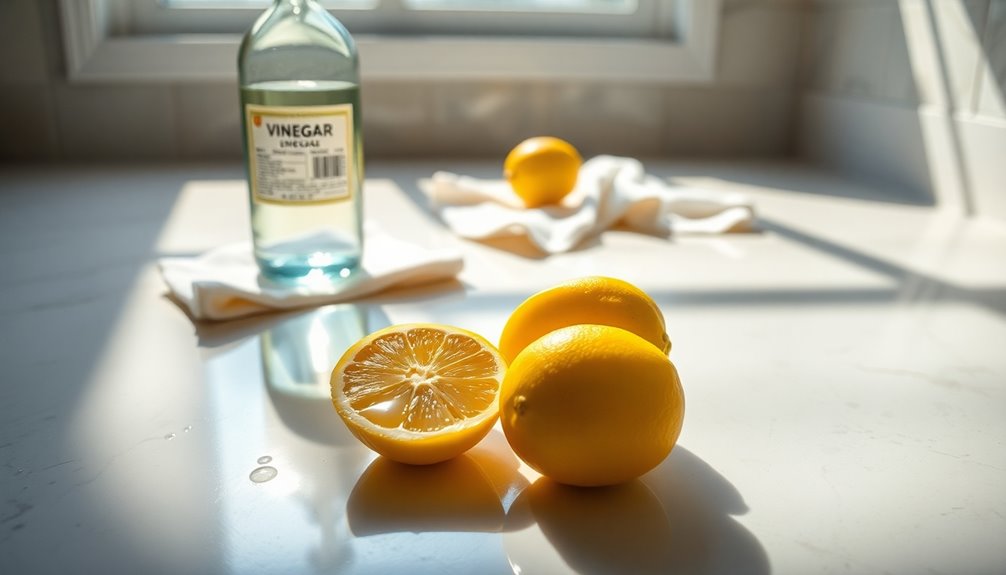
Choosing natural cleaning agents like lemon juice and vinegar can elevate your cleaning routine, but it's important to avoid common pitfalls that could undermine their effectiveness.
Natural cleaning agents like lemon juice and vinegar can enhance your cleaning, but avoid common mistakes to ensure their effectiveness.
Here are some mistakes to watch out for:
- Mixing with bleach or hydrogen peroxide: This can create harmful gases.
- Using on natural stone: Avoid lemon juice and vinegar on surfaces like granite or marble to prevent etching.
- Not testing on fabrics: Lemon juice can cause discoloration, so test it first on an inconspicuous area.
- Combining with baking soda: This fizzing reaction neutralizes the cleaning properties, making it less effective.
Always dilute lemon juice and vinegar with water when used to clean to safeguard your surfaces!
Recipes for Homemade Cleaning Solutions Using Lemon and Vinegar
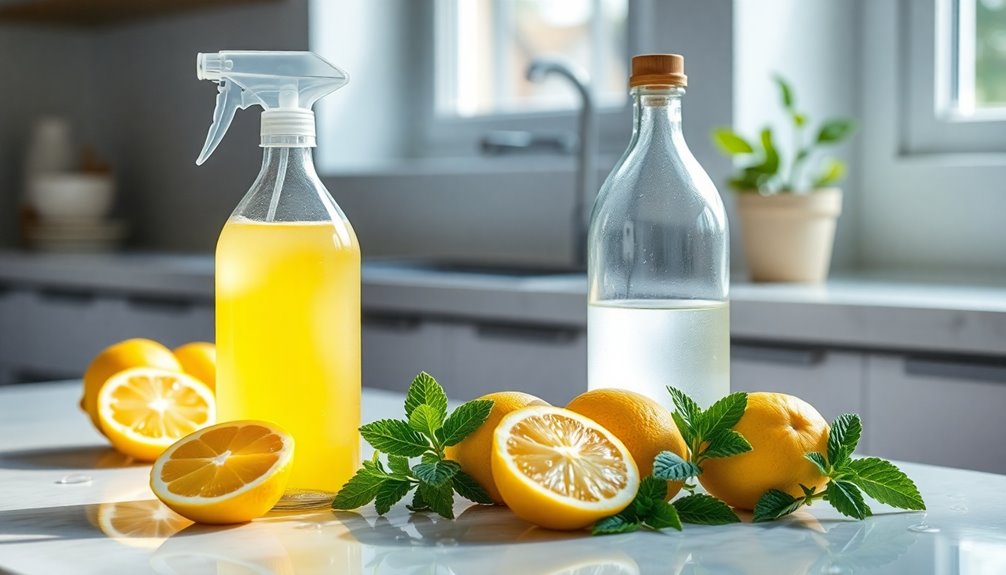
When you're looking for effective and natural cleaning solutions, lemon juice and vinegar offer versatile options that can tackle various household tasks. Here are some easy recipes you can use:
| Recipe Name | Ingredients | Duration |
|---|---|---|
| All-Purpose Cleaner | 100 ml white vinegar, 100 ml water, 1 tsp lemon juice | Use within 7 days |
| Long-Lasting Cleaner | 250 ml white vinegar, 250 ml water, 15-20 drops lemon essential oil | 6-8 weeks |
| Lemon Herb-Infused Vinegar Spray | Lemon peels, herbs, vinegar (steep for 2 weeks) | 6-8 weeks |
You can also create a deep-cleaning solution by steeping lemon peels in vinegar for two weeks. Just remember to dilute it with water before use for effective cleaning!
Frequently Asked Questions
What Does Vinegar and Lemon Do for Cleaning?
When you use vinegar and lemon for cleaning, you're harnessing their powerful properties.
Vinegar cuts through stubborn dirt and grease, while lemon juice adds antibacterial action and a fresh scent. Together, they tackle tough stains and eliminate odors effectively.
You'll find that this combination is perfect for descaling appliances and brightening surfaces. Plus, since they're non-toxic, you can clean with confidence, knowing it's safe for your family and pets.
What Surfaces Should Not Be Cleaned With Vinegar?
Imagine pouring lemon juice on a freshly polished car; it might ruin the shine.
Similarly, you shouldn't clean natural stone surfaces like granite and marble with vinegar. Its acidity can etch and damage them permanently.
Quartz countertops can also suffer, as vinegar weakens their resin.
Plus, metallic paint surfaces may lose their finish.
To keep your surfaces looking their best, avoid using vinegar on anything sensitive to acids.
What Should You Not Clean With Lemon Juice?
You shouldn't clean natural stone surfaces like granite or marble with lemon juice, as its acidity can cause etching.
Avoid using it on quartz surfaces too, since it can lead to discoloration over time.
Don't clean metallic paint surfaces with lemon juice either, because the acid may corrode the finish.
Finally, steer clear of using it on unsealed wood, as it could damage the finish or cause discoloration.
Always choose safer alternatives!
Can You Mix Vinegar and Lemon Juice for Cleaning a Toilet?
Why wouldn't you mix vinegar and lemon juice for cleaning your toilet?
Combining them creates a powerful antibacterial solution that tackles limescale and unpleasant odors effectively.
Simply mix equal parts of both, apply it to the toilet bowl, and let it sit for at least 30 minutes.
After scrubbing, don't forget to rinse!
This method not only cleans but also deodorizes, leaving your toilet fresh and sparkling without harsh chemicals.
Conclusion
Incorporating lemon juice and vinegar into your cleaning routine is like inviting nature's best allies into your home. Their powerful antibacterial properties and versatility make them a fantastic choice for a sparkling clean without harsh chemicals. By embracing these natural cleaners, you not only protect your family's health but also contribute to a greener planet. So, why not swap those commercial cleaners for these simple ingredients? Your home will shine brighter, and Mother Earth will thank you.

